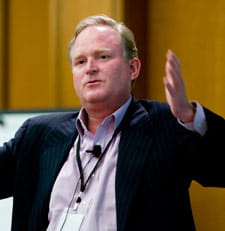Real estate conference looks past bad times to focus on new trends, including sustainable building
11/7/2008 - In a gloomy market, the Kellogg School’s Real Estate Conference offered attendees a sunnier prospect by focusing on new investment strategies underway to combat the industry downturn.
 |
| Scott Kelley ‘87, managing director of Aetos Capital, delivered one of two keynotes at the Nov. 5 Kellogg Real Estate Conference. |
| Photo © Nathan Mandell |
The theme of the Nov. 5 conference, which attracted more than 200 practitioners, alumni and students to the James L. Allen Center, was “Identifying Innovative Approaches to a Changing Global Landscape.”
Morning speaker Robert T. Buday, partner at Kirkland & Ellis LLP, began the conference by discussing the potential for emerging infrastructure investments. These investments, he explained, are long-life, high-value physical assets that are the backbone to any economy, such as power lines, toll roads and airports. They often appeal to investors seeking secure, long-term investments, said Buday, adding that governments are contemplating shifting the financial burden of these structures onto private companies who may be able to manage these projects better than the public sector.
| |
 |
Related Video |
|
| |
| |
|
| “Lenders really like infrastructure investments because they are hard assets with significant value and an inelastic demand,” Buday said. “Banks will likely focus on U.S.-based assets that will service the general public.”
Experts on an afternoon panel discussed sustainable building, a topic that has garnered significant attention from the public and the media recently.
Commercial real estate investors, panelists said, are taking their cues from LEED – Leadership in Energy and Environmental Design, a green building ratings system. The system awards ratings based on the sustainable aspects of a building’s design, materials and performance. The system has grown from fewer than 10 certified LEED projects in 2000 to more than 2,000 this year, with another 15,000 registered LEED projects in the works. Some aspects of LEED certified buildings can include solar roofing or recycled building materials.
“We view that as the future of our business going forward,” said Doug Kiersey ’02, senior vice president and regional director of capital deployment at ProLogis.
Some sustainable building improvements require only one or two years to gain a return on the initial investment but others can take more than a decade to see a payoff, the panelists noted. However, monetary profits should not be the only consideration when investing in sustainable building, said Rafael Carreira ’94, senior vice president of The John Buck Company. Employees who work in these sustainable buildings benefit from a healthier environment, which improves productivity and impacts an employer’s bottom line, Carreira said.
The conference’s keynote speaker, Scott Kelley ’87, indicated that two trends will continue to inform commercial real estate: securitization and globalization. Kelley, managing director of Aetos Capital Management and CEO of Aetos Capital Asia and Aetos Japan, said that the commercial mortgage-backed securities model that had funded the real estate industry is broken and needs to be restructured. He added that rating agencies also must regain the trust of investors. Globally, as more investors distribute money outside of their home countries, the industry will see real estate managers emerge who have specialized strategies for various market sectors.
“But everything will be on a one-to-three-year hiatus until the market works itself out,” Kelley said.
Other presentations during the day included panel discussions on how to seize opportunities in the current capital markets and in the global real estate markets.
Conference co-chairs said that they wanted the event to accent real estate’s future, rather than dwell on dismal recent circumstances that have confronted industry professionals. The conference had more than 200 attendees that included practitioners, Kellogg alumni and students.
“We wanted to make sure that we weren’t focusing on the current state of the affairs but putting focus on where people can gain value going forward and what actions they can take,” co-chair Derek Fleming ’09 said.
The conference was sponsored by the Kirkland & Ellis LLP, ProLogis, the Kellogg School’s Zell Center for Risk Research and Capri Capital Partners.






